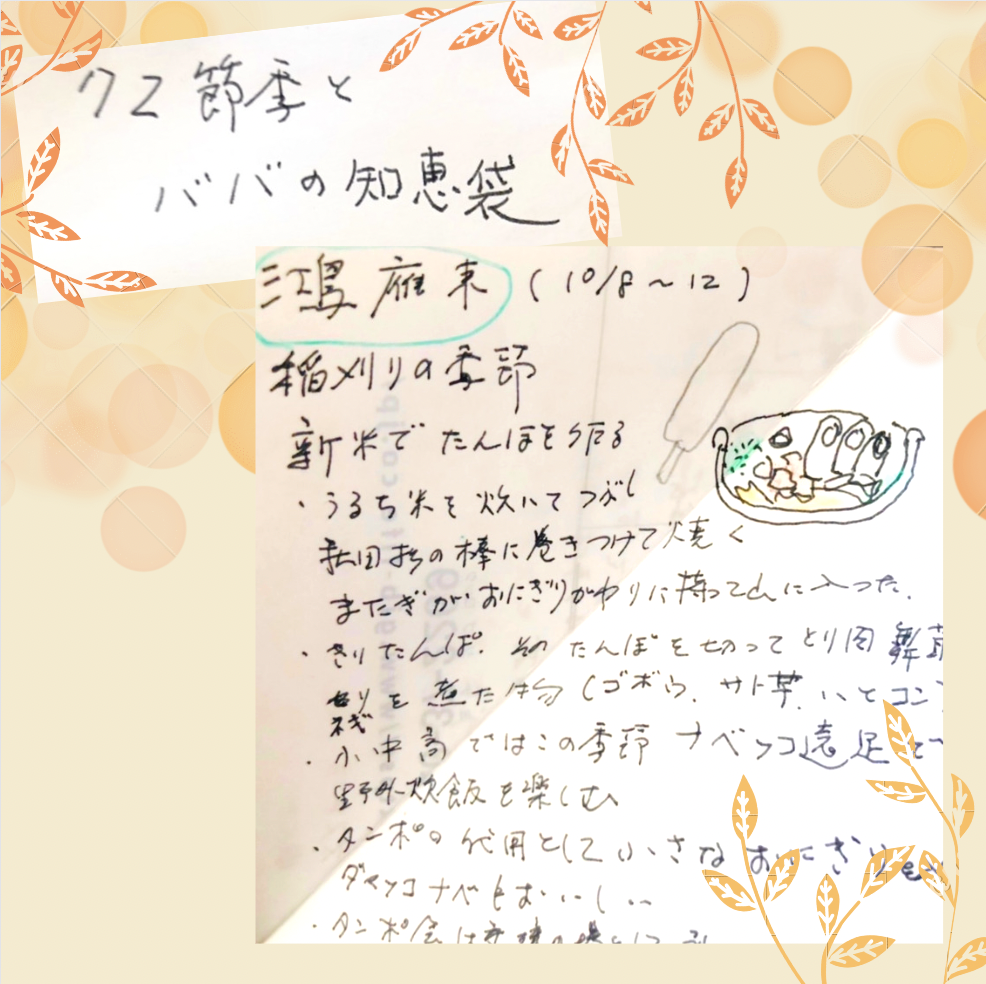October 8-12 Wild geese return
To play Shoko Hikage's original music for this micro-season
[Laptop users] Click the orange circle with a white arrow
[Mobile users] Click "Listen in browser" or if you have a SoundCloud account, click "Play on SoundCloud"
[Laptop users] Click the orange circle with a white arrow
[Mobile users] Click "Listen in browser" or if you have a SoundCloud account, click "Play on SoundCloud"
|
Pocket Grandma Wisdom - Akitababa Edition
About making “Kiritanpo,” the famous local dish in Akita, a mountainous northern prefecture of Japan's main island Around this time of the year, we cook freshly harvested rice, mash it and form it around Akita cedar skewers, then toast them over an open hearth. You can eat them with miso paste, or cut them and put them in a hot pot (Nabe) with burdock roots, scallions, Seri (Japanese wild parsley) and some chicken meat. Neighbors come together and enjoy Kiritanpo hot pot, and children cook it outdoors on school trips. Nourishing body and soul with Kiritanpo dishes, people prepare for the cold weather. Up in the sky, you’ll see wild geese returning from further north. Shoko Hikage’s octogenarian mother Yoshie Hikage (aka Akitababa) had a dedicated career in the field of education for young children. After retiring, she has been engaged in making haiku and tanka poetry featuring wild flowers. She became active in disaster recovery efforts after the Great East Japan Earthquake by housing mothers and children who lost their home due to the quake, tsunami and the radiation from the nuclear plants. After 2013, she started to read her poetry works in public in the U.S. (Santa Cruz and San Francisco) and South Korea as well as in Japan. |
Shoko Hikage began playing koto at the age of three. Her first teacher was Chizuga Kimura of the Ikuta-ryu Sokyoku Seigen Kai in Akita Prefecture, Japan. From 1985, she received special training from the 2nd and 3rd IEMOTO Seiga Adachi. In 1988, Hikage graduated from Takasaki College with a major in koto music. She was then accepted as a special research student in Sawai Koto Institute under Tadao and Kazue Sawai, where she received her master's certificate. Hikage also completed a one-year intensive seminar at the Sawai Sokyoku In. In 1992, she moved to Honolulu, Hawaii to teach koto at the Sawai Koto Kai Hawaii and at the University of Hawaii. There she held her first American solo recital at the Honolulu Academy of Arts Theatre as part of the New Music Across America Series. In 1997, she moved to San Francisco where she continued her concert and teaching activities. Hikage premiered Hyo-shin Na's “Crazy Horse" for Korean Traditional Orchestra and Koto Solo with the National Orchestra of Traditional Instruments in Seoul, Korea in November, 2011. In the Bay Area, she also premiered Hyo-shin Na’s " Night Procession of the Hundred Demons", "Koto Music" and "Koto Ninano". In 2014, Hikage gave a solo recital with a program devoted to Hyo-shin Na's music for koto/bass koto at Buam Arts Hall in Seoul, Korea. In 2017, Hikage organized historic concerts “Hengenjizai World of Koto Music” featuring two koto virtuosos, Soju Nosaka and Kazue Sawai at Herbst Theater in San Francisco. In 2022, Hikage moved back to Japan and is currently based in Fukushima, Japan.

